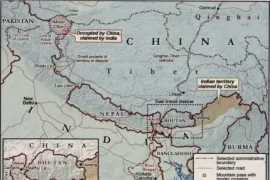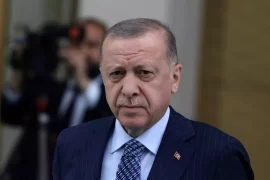Rafiga Gurbanzade
 August 6, 2012: Lobbying is generally defined as the process of seeking to influence a government and its institutions to execute policies that serve interests of a group of individuals. The Woodstock Theological Center defines lobbying as a “deliberate attempt to influence political decision through various forms of advocacy directed at policymakers on behalf of another person, organization or group” (58). The earliest instances of lobbying date back to ancient Greece and Rome, where lobbyists sought to influence senators and plebs for or against specific issues (Zetter, 6). Special interests protected by lobbying may vary from businesses and politicians to foreign governments and ethnic groups. Ethnic lobbying may advocate interests of a distinct group in the host country or may seek to influence US foreign policy of the host country towards the country of origin or third countries.
August 6, 2012: Lobbying is generally defined as the process of seeking to influence a government and its institutions to execute policies that serve interests of a group of individuals. The Woodstock Theological Center defines lobbying as a “deliberate attempt to influence political decision through various forms of advocacy directed at policymakers on behalf of another person, organization or group” (58). The earliest instances of lobbying date back to ancient Greece and Rome, where lobbyists sought to influence senators and plebs for or against specific issues (Zetter, 6). Special interests protected by lobbying may vary from businesses and politicians to foreign governments and ethnic groups. Ethnic lobbying may advocate interests of a distinct group in the host country or may seek to influence US foreign policy of the host country towards the country of origin or third countries.In the United States, the roots of ethnicity-based competition for political influence date back to the early 20th century. By 1965, the elimination of criteria for domination of any one ethnic group in the U.S. immigration legislation paradoxically added political strength to ethnic advocacy groups (Jacobson, 66). Currently, ethnic interest groups spend millions of dollars annually to influence U.S. foreign policy and to “block the influence of rival ethnic lobbies” (Ambrosio, 207). Driven by ethno-cultural differences, foreign conflicts and antagonistic interests of the rival parties, ethnic lobbies manage to mobilize strength of their constituent communities and to profoundly impact the U.S. legislative and executive decision-making processes.
The ways of influencing U.S. foreign policy can be classified into two distinct, yet highly interconnected, categories. The first category involves, mobilization and maintenance of grassroots lobbying by way of diaspora, that is, the American citizens of a distinct ethnic descent. The second category is a direct foreign government intervention through registered lobbyists regulated by the Foreign Agents Registration Act (FARA) of 1938. According to Samuel Huntington, both categories equally promote “interests of people outside the United States.” Huntington also noted that serious problems could arise when “the cultural communities transform into diasporas and take control over at least one state” (Pachon, 4). Claiming certain liberties under the First Amendment of the U.S. Constitution, some concentrated grassroots organizations or lobbyists of a “vocal minority” manage to bypass the national interest and to distort legislation or policymaking on the scale of the national impact (Schultz, 437).
One of the main objectives of ethnic lobbyists is to obtain U.S. support for the country of ethnicity’s origin over their rivals, notwithstanding the lack of the U.S. national interests in the region. Currently, around one hundred foreign governments depend on lobbyists for promoting their policies in the U.S. (Newhouse). Moreover, the number of interest group communities significantly increased in recent years. As stated in the Encyclopedia of Associations, in 2010 there were 24,000 registered organizations in the U.S., constituting a 64 per cent growth of lobbyist groups since 1980 (Smith, Roberts & Wielen Ryan, 352). According to the Foreign Affairs magazine among the strongest lobbies in the U.S. are those advocating the interests of Armenia, China, Greece, India, Ireland, Israel, Taiwan, and Ukraine. Moreover, one of the many downsides of the lobby penetration in the U.S. legislature is that “the subculture of law firms that [assist in these works] reflects a steady decline and privatization of diplomacy – with an increasing impact on how the United States conducts its own foreign policy” (Newhouse).
Ethnic lobbying is considered to be an effective way of influencing U.S. foreign aid and defense policy decisions. As ethics of ethnic lobbying has become a subject of public criticism and scholarly debates, majority of studies focused on the Jewish-American lobbying groups that pioneered ethnic lobbying. The consensus among scholars is generally divided into those who speak of the triumph of Jewish-American lobbying in formulating U.S. policy towards Israel and those who speak of the failure of Jewish lobbying due to the lack of control over the executive branch (Thomas, 230).
Among the various Jewish-American lobbying groups, the most known one is the American Israel Public Affairs Committee (AIPAC). AIPAC’s major achievement is the securing of a substantial U.S. economic and military assistance to Israel. For the past decade, Israel has been the largest per capita U.S. aid recipient (Ripley & Lindsay, 93-94). As stated in the Congressional Research Service, U.S. Foreign Aid to Israel, starting from 2007, the U.S. expanded the military aid by $150 million each year (Sharp). According to the Amendment to H.R. 4310, section 12, it is in the U.S. interest and it is the sense of Congress that the U.S. “provides Israel such support as to increase development of joint missile defense systems that defend the urgent threat posed to Israel and United States forces in the region”.
relevant article: NATIONAL REINTEGRATION POLICY FOR MIGRANTS: A CRITICAL APPRAISAL
The two other powerful ethnic lobbies in the U.S. are those of Greek- and Armenian-Americans. Both groups seek to influence U.S. foreign policy in support of Greece and Armenia, respectively, and are united by their antagonistic agenda against the rival Turkey. Just over the last year, the two lobbies managed to introduce 10 Congressional resolutions critical of Turkey in one way or another. During the 2011 hearings on House Resolution 306 that accused Turkey of religious discrimination, Representative Dana Rohrabacher (R-CA) expressed his frustration that, while Turkey had a better record of religious tolerance than most majority-Muslim countries, his fellow lawmakers were exercising a “terrible double standard” by singling out Turkey to please constituents of Greek and Armenian heritage (AFP).
Greek-Americans established their first lobbying group, American Hellenic Institute (AHI), in 1974. The formation of AHI and the mobilization of Greek-Americans, who currently number an estimated 1.5 million nationwide, were inspired by the Greek-Turkish standoff over Cyprus (Cameron, 90). Driven by the anti-Turkish policy agenda, AHI successfully convinced Congress to place an arms embargo against Turkey from 1975 to 1978, in violation of the Foreign Military Sales Act. In addition, being actively involved in congressional committees and obtaining support from grassroots groups, AHI successfully secured military aid to Greece by 70 per cent higher than to Turkey, and cancelled economic aid to Turkey in 1995, thus impeding the U.S.–Turkish trade in the northern sector of Cyprus (Cameron, 90; McCormick). By 2001, the number of AHI members accumulated up to 25,000 with 20,000 additional members functioning in an auxiliary organization (Cameron, 90). Greek-American lobby also supports Greece’s ongoing obstruction to Macedonia’s NATO admission over the naming dispute. The obstruction is despite the fact that Macedonia provided critical support and has been a key staging ground to U.S. and NATO operations in former Yugoslavia.
Armenian-American lobby in the U.S. builds upon a sizeable community that numbers over half a million in California alone. The largest grassroots organization, Armenian National Committee of America (ANCA), is a U. S. affiliate of the Armenian Revolutionary Federation (ARF), a left-wing nationalist party that dominated Armenian politics since 1890 (CREW). The other Armenian-American lobbying group is the Armenian Assembly of America (AAA). Like the Jewish-American special interest, ANCA and AAA secured U.S. economic assistance to Armenia, making it the second largest per capita recipient of U.S. aid after Israel (Mainville). The total amount of U.S. assistance to Armenia since 1992 topped $2 billion (Nichol).
Apart from aid issues, both ANCA and AAA focus efforts around a strong anti-Turkish and anti-Azerbaijani agenda, such as the blocking of U.S. financial and military aid to Turkey and Azerbaijan, pressing resolution of the Nagorno-Karabakh conflict between Armenia and Azerbaijan in favor of the former, and seeking legislative recognition of the alleged Armenian genocide (Cameron, 91). In 2010-11, under pressure from ANCA and facing reelection, Senators Barbara Boxer (D-CA) and Robert Menendez (D-NJ) effectively blocked the nomination of Matthew Bryza, a career U.S. diplomat, as the Ambassador to Azerbaijan. ANCA representatives did not hide their concern over the ethnic Turkish background of Bryza’s wife (De Waal). Even after the recess appointment by President Obama and a year of service, Bryza’s confirmation met obstruction from Senator Menendez, effectively ending the diplomat’s career.
ANCA advocates were also successful in securing full U.S. economic and political support for Armenia amidst its ongoing occupation of Nagorno-Karabakh and surrounding seven regions of Azerbaijan since the early 1990s (CIA). While the United Nations Security Council adopted 4 resolutions calling for immediate and unconditional withdrawal of Armenian forces in 1993, Senator John Kerry (D-Mass.) authored Section 907 of Freedom Support Act, which prohibited any U.S. aid to Azerbaijani government until it “ceases the illegal blockades of Armenia and Nagorno-Karabakh” (Ambrosio, 156).
One of the factors by which the Armenian-American lobby’s agenda contradicts U.S. strategic interests is that, while Turkey is a NATO member and Azerbaijan is a more attractive economic and strategic partner (Ambrosio, 207), Armenia hosts the only remaining Russian military base in the South Caucasus and maintains close cooperation with Iran (Lucas). According to Wikileaks, in 2008 Armenian government supplied Iran with rockets and machine guns that were later used to kill at least one U.S. serviceman in Iraq (Lake).
The strength of the Armenian and Greek interest groups is the result of the weakness of the Turkish and Azerbaijani lobbies in the past (Ambrosio, 153). As noted in the Turkey at the Crossroads: Ottoman Legacies and Great Middle East, “Turkey has historically met the joint opposition of the powerful Armenian- and Greek- American lobbies, and suffered from the absence of an effective pro-Turkish lobby”(Jung & Piccoli, 169). In recent years, Turkey and Turkish-Americans, who number over half a million, have intensified efforts to counter the two opposing lobbies using similar techniques. As stated in the Turkish Coalition of America (TCA) reports, in 2012, the Congressional Turkish Caucus has grown to more than 150 lawmakers, already surpassing the Armenian Caucus. Additionally, according to the Turk of America Magazine, Turkish-Americans have joined the top contributors to political causes on the Hill over the last years.
Historically, the U.S. has been rich in variety of ethnic groups, cultures, religions and backgrounds. The challenge to the U.S. is not caused by the abounding and diverse fabric of its nation, but by the individual interest groups that serve political causes other than those of in the interests of America. As stated by the former Secretary of Defense, James Schlesinger in 2001, “the United States has less of a foreign policy in a traditional sense of a great power than we have the stapling together of a series of goals put forth by domestic constituency groups” (Albert, 41). Consequently, as result of ethnic lobbying, U.S. foreign policy loses its cohesiveness, weakening America’s position as a global leader.
Rafiga Gurbanzade is a student at the Department of Criminology, Law & Society University of California, Irvine
Source: www.eurasiareview.com







